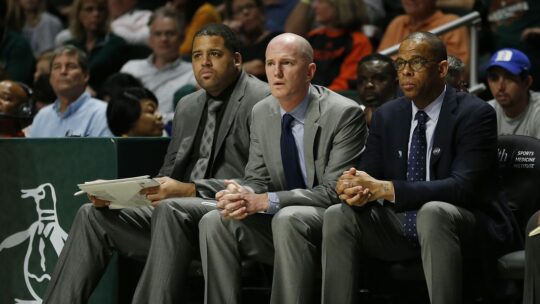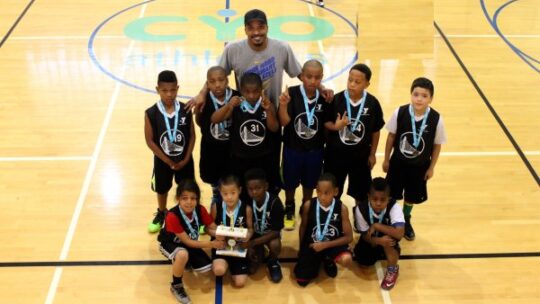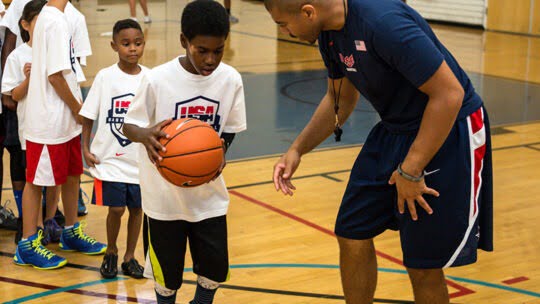Basketball Coaching Tips – How to Have a Successful Season
A “must-have” set of basic basketball coaching tips seems to come from anyone who has ever picked up a clipboard and whistle.
I guess I’m no different. The following aspects of coaching the game of basketball are, to me, the bedrock of a successful season and the foundation of becoming a good basketball coach.
You can survive without these coaching skills, and you may even win a few basketball games without them. But you will not win consistently, and you will not win against strong teams unless you – the coach – can do these things.
And on top of that, without considerable focus on these skills, you cannot progress in your abilities to coach basketball.
So, the Champs Hoops team discusses plenty of skills needed to make a person an effective coach, here are a few coaching tips to help us approach the game in the right manner:
Youth Basketball Coaching Tips
-
Be Organized and Prepared
Good organization begins way before the season begins. If you aren’t organized, your players will not progress and your team will not improve.
This is essential in coaching basketball – I have seen so many coaches out on the court with a vague idea of what they want to do but no plan.
Sometimes they win, but that’s due almost solely to the natural abilities of their players. If you want to make a difference, always be prepared and organized.
There are, of course, other aspects to being prepared. Keep track of player progress (more on that below), stay on top of game stats so you can spot weak points in your team’s play, be prepared to prevent and treat an injury, organize home games and transportation for away games, have road trips planned out well in advance – the list never stops!
-
Maintain Discipline and Focus
Basketball Practices need to be learning experiences, and not just about how to shoot a basketball or how to pass (although they are important!). Attitude is more important than skill, especially if you look at the larger picture, at what we want our players to take from their experience with us in the world after basketball.
Practice sessions are not just for learning physical skills – they’re also for learning mental skills. If our players can’t focus in practice, that ability won’t magically appear in the game.
Start each practice with a brief overview of what you want to focus on – e.g., improve passing skills – so players know what you are looking for. Then keep them on task and motivate them to work hard to constantly improve.
Players need to work hard and remain focused for the entire practice. They can have fun, and enjoy what they are doing, as long as they are working hard and trying to improve to the best of their ability.
You only have so many practices before the season begins, and you can’t afford to waste any – be guaranteed your competition will not. And by improving their ability to focus in practice, your players will be able to focus better in the game, where it counts.
Along those lines, here’s another coaching tip: going into every game you should develop game goals for the team – outcomes or actions you want the team to focus on (perhaps this is another basketball coaching tip all on its own, but I’ll mention it here anyway.)
Maybe it’s a rebounding target or reducing turnovers. It’s whatever you think the team needs to work on the most, based on what you have seen in your previous games’ stats and practices.
Whatever the game goals, your players need to be focused on achieving them, while at the same time doing everything else the game of basketball requires of them.
-
Model Proper Behavior
The coach’s attitude sets the tone for the rest of the team.
Consider what we want our players to do:
- Show up 15 minutes early to work on their weak points.
- Stay focused throughout the entire practice and work hard.
- Stay ten minutes after practice just to squeeze in a little more time on what they’ve learned
- Work on skills in their spare time, of their initiative
- Respect the game and the officials and their opponents
- Respect themselves and their teammates
But players will emulate their coach. If the coach screams at the refs, throws chairs, screams at his players, or makes snide comments on the bench, you can bet this will carry over to the players, and bad attitudes and technical fouls start to fly all over the court.
The coach needs to be the model of appropriate behavior, disciplined during practices, collected during games, and the foundation upon which the team is built.
Your behavior on the court stems from your philosophy on coaching basketball. Determine for yourself what you want your players to achieve through your coaching, use this as the basis for developing your coaching philosophy, and then stay true to that philosophy as you coach and deal with your players.
-
Every Player is an Individual
Every player is different, and each basketball position requires a focus on different skills, so each player’s development has to be handled individually.
Just as you set goals for the team to accomplish during pre-season (e.g., run a proper fast break, and effectively execute plays), you need to set goals for individual players as well.
Individual player goals will mostly take the form of skill improvement, whereas team goals will be more along the lines of teamwork and execution of team strategy. Specific goals will help players focus clearly on what they are trying to accomplish and will make them more likely to achieve success.
From the beginning of the season, evaluate your players to determine what skills they need to improve on, assign each of them a prioritized list of skills they need to work on, and then encourage (demand?) players to be at practice for 15 minutes early to work on developing these skills.
Continually observe their progress in these pre-practice sessions, as well as through practice observation and by using game stats.
Make adjustments as you go along, tweaking instructions according to how your players are progressing, and when they finally succeed at reaching their goals, acknowledge their achievements and then set new goals and start all over.
Another basketball coaching tip on game stats: they can be useful in identifying improvement and weak spots, but don’t become a slave to them, and don’t let your players become obsessed with their stats.
-
Be a Team Builder
This is a team game, and while your players’ individual development is important, the team must be able to trust each other and act as one.
Coaches tend to be focused on the game – the skills and strategies needed to win. Turning the focus to a “soft skill” like building relationships doesn’t come naturally to a lot of us, myself included.
Here are some possible ways to accomplish this:
- Start every season right after tryouts with a team retreat. It doesn’t need to be anything extravagant, just a day or two where the team is together and plays games (not necessarily basketball) and works together. This can be the beginning of the development of your team identity.
- Build team camaraderie through activities such as fundraising. This serves another, more obvious purpose that is important in its own right – raising money to pay for various expenses – but having your players involved in the planning and execution of the fundraising activities also gives them a sense of collective purpose and will help them gel in the process.
- Host a basketball tournament. Again, this serves more than one purpose – playing the tournament gives your team more playing experience so that they become a stronger team, as well, as organizing the tournament schedule, preparing for it, and managing the various activities that go along with it help the team become more of a team.
- Set up a “fan appreciation” night, where your players can barbeque hot dogs or something for fans before a dance. Hand out booster buttons to anyone who buys – this will serve as a community-building activity as well as a team-building activity. Ask parents to help if you want, but the focus needs to be on the players.
- Be liberal with organizing team-building activities, such as Christmas parties, and maybe use some of that fundraising money on affinity gear for the team – and for more fundraising by selling more of that affinity gear to fans.
Whenever possible, give your players a sense of ownership of the team – with a more personal stake in the team’s success and image, they’ll work harder and perform better. Get them involved.
-
Be a Program Builder
It’s not just a team you are building, but an entire program. The team is the nucleus of the program, but if you are aiming for championships, you can’t be insulated from everything else going on. You need to focus on developing your team, but you also need to focus on developing your program as a whole.
Building a championship program requires you to:
- Build support systems with the school, parents, student union, booster clubs, and local businesses
- Promote and market the team, within and outside the school
- Develop your abilities (see coaching tip #7)
- Create relationships with feeder programs as well as college programs
To condense this basketball coaching tip into one sentence – see the big picture and constantly work to improve upon what you have already built.
-
Never Stop Learning
If you want to grow something, you need to water it regularly. If you want your coaching skills to improve, you have to continuously strive to improve your knowledge and your system – the things you do and the way you do things.
Always be reading up on how other basketball coaches have done things, experiment with new approaches, and new basketball strategies, take note of what worked and what didn’t, keep the good and drop the bad, and always be refining the system.
Keep your eyes open, because there are always more coaching tips to be found and different ways to do things.
Attend seminars and coaching clinics – you likely have some governing body in your region that provides periodic clinics or certification courses, so find out what that organization is and sign up for their newsletter or RSS feed. Keep abreast of what is going on.
There are plenty of more coaching tips out there, and I’ll continue to revise and add them as time goes on. But these few are a good place to start.
Related Post





